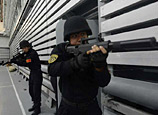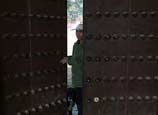
BEIJING, April 3 (Xinhua) -- Chinese public have been advised against slaughtering poultry for ancestral worship on the upcoming Tomb-Sweeping Day as authorities strengthen H7N9 bird flu control efforts after three deaths of the newly-found strain that has not previously been detected in humans.
The Tomb-Sweeping Day that falls on Thursday will be an occasion to commemorate the dead, when traditionally some southern Chinese regions have the convention of killing poultry for ancestral worship.
Feng Zijian, director of the health emergency center of the Chinese Center for Disease Control and Prevention (CDC), reminded the public to take precautions against the virus in crowded places and not to contact poultry during the upcoming Tomb-Sweeping holiday on April 4-6.
Feng suggested the public not to contact birds or chickens during worship rituals so as to reduce the risk of contracting the H7N9.
Two infections of H7N9 avian influenza, involving one death, have been reported in east China's Zhejiang Province, bringing the total number of infected people in the country to nine.
Seven other H7N9 bird flu cases had been reported previously, two in Shanghai, one in Anhui and four in Jiangsu. The two in Shanghai died and the other five are in critical condition under treatment in Nanjing, capital of Jiangsu.
The World Health Organization reported the earlier cases on Monday.
LESS HARMFUL THAN SARS
Feng denied the possibility that the H7N9 could be developed into a public health incident like SARS (Severe Acute Respiratory Syndrome) 10 years ago, which claimed the lives of several hundred people on the Chinese mainland, Hong Kong and Taiwan, by being transmitted through humans.
"H7N9 is completely different from SARS, and those who had contact with the nine patients have no relevant symptoms," Feng said.
"No human-to-human transmission of H7N9 has been discovered and no epidemiological connection between these cases has been found so far," he said.
With enhanced monitoring, more H7N9 cases will be found in the future, Feng warned.
He also denied links between H7N9 and dead pigs retrieved from Shanghai rivers. "So far, no direct etiology evidence has been obtained from poultry and pigs, with investigations underway."
The National Health and Family Planning Commission has distributed detection reagent in the mainland's 31 provinces, autonomous regions and municipalities to enhance monitoring of pneumonia of unknown factors.
The subtype of H7N9 virus has not been contracted to human beings before. It shows no signs of being highly contagious among humans, according to the clinical observation on the cases' close contacts.
However, as few cases of human infection of H7N9 have been found, relatively little research has been done on it. There are no vaccines against the H7N9 virus either at home or abroad.
"Usually a R&D phase of vaccines takes about six to eight months, and for newly found virus, it may take longer," Feng said, adding that national health authorities are currently conducting research on vaccines.
NATIONWIDE CONTROL
The national health commission also distributed prevention and control plans and technique directives to health institutions nationwide.
"Infection sources have not been clear so far, but based on past experience and recent epidemiological studies, the sources could be poultry or their secretion and excrement," according to the plan.
It says the spreading of the virus is through respiratory systems or by closely contact with poultry.
People at high risk are poultry raisers, sellers, butchers and meat processors, the plan says.
The national health commission asked various health institutions to report suspected and confirmed cases directly to the national commission within two hours, and any local epidemic situation should be reported on a daily basis.
The commission said in a circular that hospitals are prohibited to delay or refuse treatment of H7N9 contractors due to the patients' lack of money.
Authorities in Chinese regions have ordered health institutions to step up monitoring.
Zhejiang has initiated an emergency response for epidemics, and relevant departments have been asked to take precautionary action toward disease control.
Shanghai authorities has prohibited the sale of live poultry and wildfowl and enhanced monitoring of major poultry markets.
Beijing has ordered hospitals to include H7N9 bird flu testing in routine monitoring and to train hospital staff on how to treat pneumonia caused by unknown factors.
Health authorities in Hong Kong and Macao Special Administrative Regions have strengthened monitoring of suspected cases.
















 1,000-meter-long Spider Walk of Canton Tower opens
1,000-meter-long Spider Walk of Canton Tower opens


![]()
